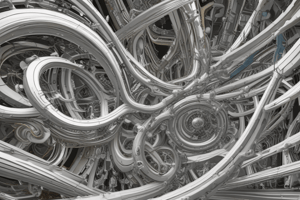Podcast
Questions and Answers
Which mechanical property of fluids is the force per unit area acting upon a material?
Which mechanical property of fluids is the force per unit area acting upon a material?
- Viscosity
- Density
- Pressure (correct)
- Surface tension
What is the term used to describe a fluid's resistance to flow?
What is the term used to describe a fluid's resistance to flow?
- Surface tension
- Viscosity (correct)
- Pressure
- Density
What term describes the mass of a fluid per unit volume?
What term describes the mass of a fluid per unit volume?
- Pressure
- Density (correct)
- Viscosity
- Surface tension
Which mechanical property of fluids causes the surface of a liquid to contract into a minimum area?
Which mechanical property of fluids causes the surface of a liquid to contract into a minimum area?
In a fluid, stress due to the weight of the fluid above a point is known as:
In a fluid, stress due to the weight of the fluid above a point is known as:
The pressure inside a fluid is distributed evenly throughout, leading to the concept of:
The pressure inside a fluid is distributed evenly throughout, leading to the concept of:
What determines a fluid's buoyancy?
What determines a fluid's buoyancy?
Which property of a fluid is related to its resistance to flow or change in shape?
Which property of a fluid is related to its resistance to flow or change in shape?
What causes capillary action in a narrow tube?
What causes capillary action in a narrow tube?
What is shear stress in fluid mechanics?
What is shear stress in fluid mechanics?
Which field does not heavily rely on fluid dynamics?
Which field does not heavily rely on fluid dynamics?
Why is understanding fluid dynamics crucial?
Why is understanding fluid dynamics crucial?
Flashcards are hidden until you start studying
Study Notes
Mechanical Properties of Fluids: A Journey Through Fluid Dynamics
Fluid dynamics, the study of fluids in motion, is a cornerstone of our understanding of the natural world and the technologies that power our lives. Fluids, from gases to liquids, exhibit unique mechanical properties that govern their behavior and interactions with other substances. In this article, we'll dive into the essential aspects of fluid mechanics, focusing on the mechanical properties of fluids.
Basic Concepts
Fluids are substances that can flow and take the shape of the container they occupy. Fluid behavior can be described using the following fundamental concepts:
- Pressure: A force per unit area applied normal to the surface of a fluid.
- Density: The mass of a fluid per unit volume.
- Viscosity: A measure of a fluid's resistance to flow.
- Surface tension: A force that causes the surface of a liquid to contract into a minimum area.
Fluid Pressure and Stress
Pressure inside a fluid is distributed evenly throughout, meaning that pressure at any point is exerted equally in all directions. This leads to the concept of stress, which is the force per unit area acting upon a material. In a fluid, the stress is described as hydrostatic pressure, and it results from the weight of the fluid above a particular point.
Fluid Density and Buoyancy
Fluids have mass, and thus, they have density, which is the mass per unit volume. The density of a fluid determines its buoyancy, or its ability to support its own weight. When an object is immersed in a fluid, it experiences an upward force equal to the weight of the fluid displaced by the object.
Fluid Viscosity and Shear Stress
Fluid viscosity is a measure of how easily a fluid flows and deforms under stress. Viscosity is related to the resistance of a fluid to flow or change in shape. Shear stress is the tangential force per unit area that acts upon a fluid when it moves relative to another fluid or solid surface.
Surface Tension and Capillarity
Surface tension is the cohesive force at the surface of a liquid that causes the liquid to contract into a minimum area. Capillary action, or capillarity, is the movement of a liquid upwards or downwards in a narrow tube due to surface tension. This phenomenon is essential in processes such as plant absorption of water from the soil and the wicking of moisture in fabrics.
Applications of Fluid Dynamics
Fluid dynamics has countless applications in our daily lives, from weather forecasting to designing airplanes, and from understanding the human heart to creating advanced materials. Some of the most important real-world applications of fluid dynamics include:
- Aerodynamics
- Hydrodynamics
- Biological fluid mechanics
- Naval architecture
- Material science
In conclusion, understanding the mechanical properties of fluids is crucial for grasping the fundamental principles of fluid dynamics. It provides the basis for exploring advanced technologies and understanding natural phenomena, both on Earth and beyond. With the help of fluid dynamics, we can continue to develop innovative solutions to challenges in various fields, from medicine to space exploration.
Studying That Suits You
Use AI to generate personalized quizzes and flashcards to suit your learning preferences.




